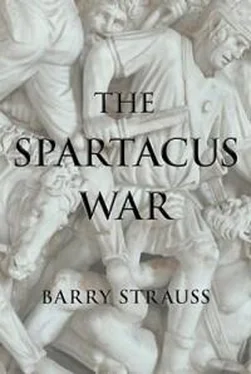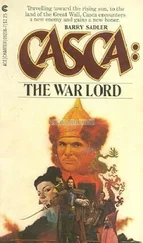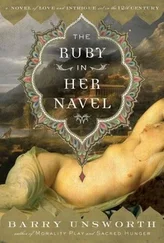Non-Communist revolutionaries admired Spartacus as well. Toussaint L’Ouverture, the hero of the Haitian Revolution, history’s only successful mass slave revolt, emulated Spartacus. Giuseppe Garibaldi, who fought to unify Italy, wrote the preface to a novel about Spartacus. Vladimir Jabotinsky, the Zionist revolutionary, translated that novel into Hebrew. Voltaire, the French Enlightenment philosopher, judged Spartacus’s rebellion as perhaps the only just war in history. Even anti-Communists approved of Spartacus: Ronald Reagan, for example, cited him as an example of sacrifice and struggle for freedom [1] in the so-called ‘Westminster Speech’ before the British Parliament in London, 8 June 1982, http://www.heritage. org/Research/Europe/WM106.cfm.
.
But while Spartacus was the stuff of legend he was no myth. He is, however, an enigma to us. Spartacus left no writings. His followers scratched out no manuscripts. Surviving ancient narratives come from Roman or Greek writers who wrote from the point of view of the victors. To make things worse, few of their writings survive. Still, they leave absolutely no doubt about it: Spartacus was real.
Plutarch (c. AD 40s-120s) and Appian (c. AD 90s-160s) provide the most complete accounts of Spartacus to survive from antiquity but they are short, late (150-200 years after the revolt) and each come with an axe to grind. Even shorter is the discussion by Florus (c. AD 100-150), but his concise remarks are full of significance. These three writers relied on important but now mostly lost earlier works by Sallust (86-35 BC) and Livy (59 BC - AD 12). Almost nothing of Livy’s discussion of Spartacus survives, and we have only a precious few pages’ worth of selections from Sallust’s account of the war.
Three other contemporaries of Spartacus comment briefly on his activities: the great orator Cicero (106-43 BC), the scholar and politician Varro (116-27 BC) and the inimitable Julius Caesar (100-44 BC). Many other ancient writers over the centuries mentioned Spartacus, from the poet Horace (65-8 BC) to St Augustine (AD 354-430), although they add but little. Even by the standards of ancient history, it represents slim pickings.
However, there are archaeological finds, the results of topographical research, and experiments in historical reconstruction ranging from gladiators’ contests - without real weapons, of course - to weaving vines into ropes such as Spartacus’s men used to climb down Vesuvius. Coins, frescos, sling balls and fortifications all record the rebels’ path through the Italian countryside. The bones of a gladiators’ cemetery in Turkey reveal training secrets and recall the agony of death. Tombs, shrines and towns; gold and iron; plaques and paintings: all take us beyond the stereotypes of barbarians in Greek and Roman texts. Finally, Roman slavery comes to life through graffiti, chains, auction buildings, slave quarters and slave prisons.
The story of Spartacus is, first of all, a war story: a classic case study of an insurgency, led by a genius at guerrilla tactics, and of a counter-insurgency, led by a conventional power that slowly and painfully learned how to beat the enemy at his own game. The Spartacus War is also a tale of ethnic conflict. Spartacus was Thracian but many of his men were Celts; they were proud, independent and fighting-mad. Tribal divisions turned the rebels into feuding cliques who ignored their chief. The march for freedom degenerated into gang warfare, and, as so often in history, the revolution failed.
In addition, the Spartacus narrative is a love story and a crusade. Spartacus had a wife or mistress; her name is not recorded. A priestess of Dionysus, this unnamed companion preached a rousing message. She drew on the liberation theology that had fired Rome’s earlier slave revolts and still fuelled the anti-Roman war that had raged for fifteen years in the eastern Mediterranean. Spartacus had a divine mission.
And finally, The Spartacus War is also a story about identity politics. A rebel against Rome, Spartacus was more Roman than he cared to admit and certainly more than the Romans could admit. He terrified the Romans not just because he was foreign but because he was familiar.
Spartacus was a soldier who had served Rome, and his behaviour might have reminded Romans of their heroes. Like Marcellus, perhaps Rome’s most red-blooded general, he thirsted to kill the enemy commander with his own hand. Like Cicero, he was an orator. Like Cato, he was a man of simple tastes. Like the Gracchi, he believed in sharing the wealth among his men. Like Brutus, he fought for freedom.
Like the most ambitious Roman of them all, he claimed to have a personal relationship with a god: like Caesar, Spartacus was a man of destiny. No sooner had he died than men began to dream of Spartacus’s return. The human Spartacus fell to the power of Rome; the legend might topple empires still.
The Spartacus War describes the complexity of slave revolts too. We do not know if Spartacus wanted to abolish slavery but, if so, he aimed low. He and his men freed only gladiators, farmers and shepherds. They avoided urban slaves, a softer and more elite group than rural workers. They rallied slaves to the cry not only of freedom but also to the themes of nationalism, religion, revenge and loot. Another paradox: they might have been liberators but the rebels brought ruin. They devastated southern Italy in search of food and trouble.
In the end, the story comes back to Spartacus. Who was he? What did he want? Our answers must be based less on what Spartacus said, about which we know little, than on what he did. By necessity, we must be speculative. But we can also be prudent in our speculation because Spartacus’s actions speak loudly. They fit the timeless patterns of insurgencies and uprisings, as shaped by the particulars of his case.
Rome was big, strong and slow; Spartacus was small, hungry and fast. Rome was old and set in its ways; Spartacus was an innovator. Rome was ponderous, while Spartacus was nimble. The Romans suffered so badly from Spartacus’s ambushes, night moves, sudden turnabouts and mobile flank attacks that eventually they gave up facing him in battle. They insisted on isolating his forces and starving them out before they were willing to risk combat.
The ancient sources describe a man of passion, thirsting for freedom and burning for revenge. Spartacus’s actions tell a different story. He was no hothead but a man of controlled emotions. Spartacus was a politician trying to hold together a coalition that was constantly slipping out of control. Whether by nature or training he was a showman. His greatest prop was his own body but Spartacus used many symbols, from a snake to his horse, to form his image. A cult of personality helped attract tens of thousands of followers but at a price of luring them into the delusion of invincibility.
Spartacus was Thracian, and in Thrace warfare was the most honourable profession. The name Spartacus - Latin for Sparada kos - is plausibly translated as ‘Famous for his Spear’. Thracians were masters of the horse, which made them fast, mobile and utterly different from the Romans, who were born infantrymen with little talent for cavalry. And the Thracians had a genius for guerrilla warfare. They perfected light armour for foot soldiers and hit-and-run tactics, to which the heavy-armed Romans were vulnerable. And thanks to his service in an auxiliary unit of the Roman army, Spartacus had been schooled in conventional warfare too.
When it comes to the Romans, our evidence is better, if still limited. The Romans were constrained by the enduring strategies of counter-insurgency. They had to locate, isolate and eradicate an enemy who avoided pitched battle while harassing them via unconventional tactics. To do this required achieving superiority in intelligence, which in turn required local knowledge. Still, while no Roman adopted a strategy of winning popular support, they displayed more savvy in dealing with locals than we might expect.
Читать дальше












